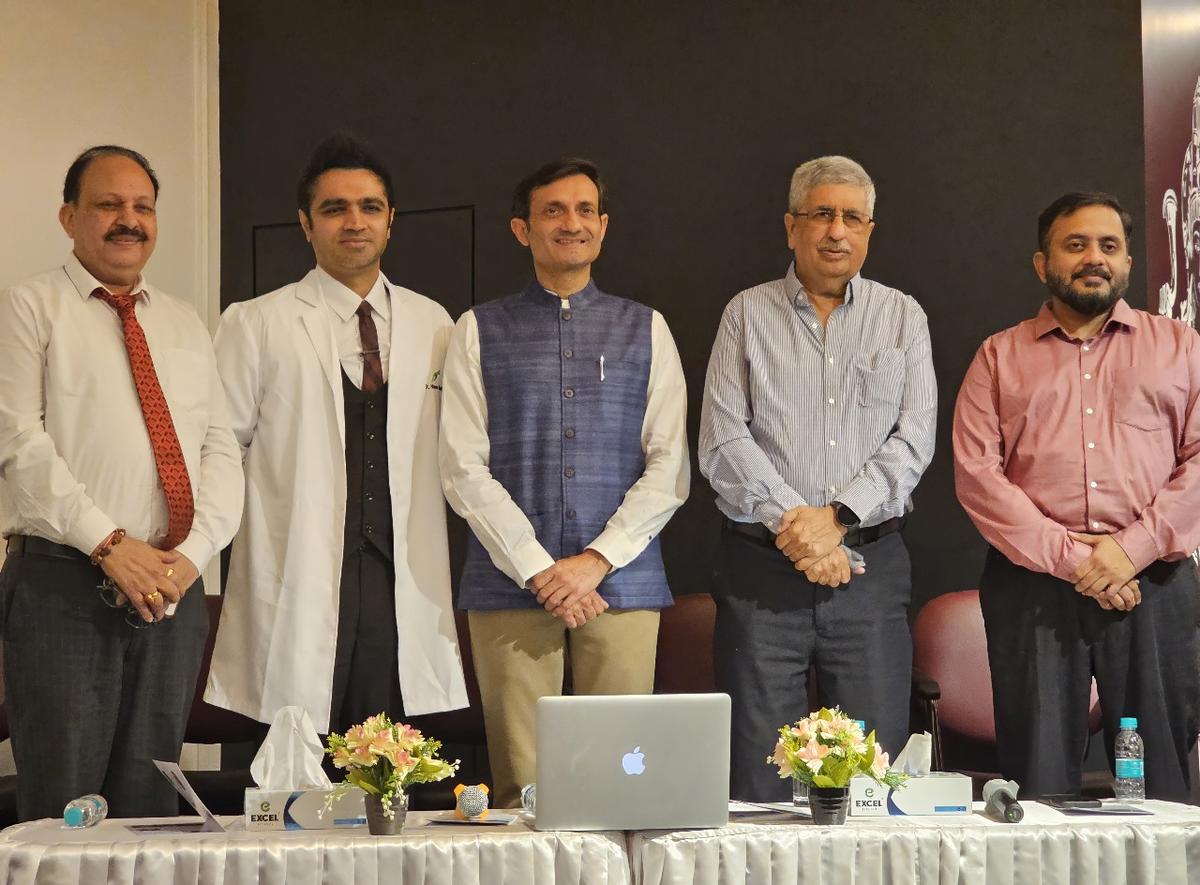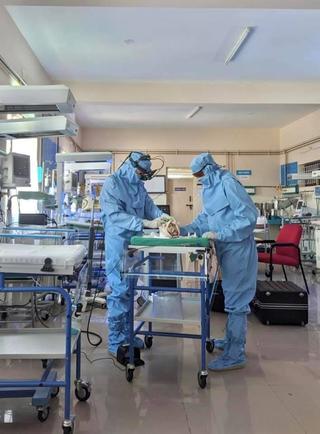KIDROP, a public-private partnership with the Karnataka government dedicated to preventing infant blindness, is now preparing for a major nationwide expansion. Known for its innovative approach to screening and treating retinopathy of prematurity, the programme has already transformed neonatal eye care in Karnataka’s government and rural hospitals. Its expansion marks a crucial moment for India, where thousands of premature infants remain at risk due to limited access to specialised eye care. As the initiative scales up, experts say this growth signals a significant leap toward equitable, technology-driven healthcare that prioritises early detection and timely intervention across the country.
The nationwide rollout has also drawn interest from international health organisations, many of which view KIDROP as a scalable model for low-resource settings. Representatives from global neonatal and ophthalmic forums have noted that India’s approach—leveraging telemedicine and mobile screening—could serve as a blueprint for other countries facing similar challenges. They stress that retinopathy of prematurity is a global concern, especially in regions where neonatal care is improving but specialised eye care remains scarce. As India expands KIDROP, global experts hope to study its outcomes and adapt key components for international use, strengthening global efforts to reduce preventable childhood blindness.
Some practitioners emphasise that integrating KIDROP into medical education could further strengthen its impact. They propose adding specialised modules on retinopathy of prematurity to paediatrics, ophthalmology, and nursing curricula across India. Introducing young doctors and health workers to the programme’s protocols would not only improve awareness but also build a future workforce capable of sustaining nationwide screening efforts. Medical colleges adopting KIDROP’s training materials could create uniform standards of diagnosis and treatment, reducing regional disparities. This educational integration, experts argue, would ensure that emerging professionals remain well-equipped to support early-intervention programmes throughout their careers.
The initiative’s expansion has also prompted calls for closer collaboration with neonatal intensive care units in private hospitals. While public hospitals handle a significant portion of premature births, many private facilities lack structured screening programmes for retinopathy of prematurity. By partnering with KIDROP’s network, these hospitals could offer early screening without needing to establish independent systems. Health experts believe such collaborations would create a seamless care pathway across public and private sectors, reducing the risk of infants falling through systemic gaps. Establishing standardised protocols across all hospitals could substantially improve nationwide screening coverage.
As anticipation builds for the programme’s rollout, KIDROP leaders acknowledge that public trust will play a crucial role in its success. They emphasise the importance of transparent communication, timely reporting of outcomes, and community engagement. Parents must understand not only the benefits but also the urgency of early screening, especially in the vulnerable weeks after premature birth. Community-based awareness sessions, social workers, and frontline health volunteers are expected to become key allies in spreading this message. By fostering trust and understanding at the grassroots level, the nationwide expansion aims to ensure that every eligible infant receives life-changing access to early eye care.

A Landmark Model of Early Detection and Rural Outreach
KIDROP’s success in Karnataka stems from its ability to bridge the gap between urban specialists and rural newborns through mobile screening units, trained technicians, and telemedicine. Since its launch, the programme has screened thousands of premature infants, identifying cases that would otherwise have gone unnoticed until irreversible damage occurred. The Karnataka government’s support has enabled the initiative to integrate seamlessly with district hospitals and neonatal units. With its expansion nationwide, more states are expected to adopt similar models, ensuring high-risk infants across India receive timely diagnosis and treatment irrespective of their geography or socioeconomic background.
Experts describe KIDROP as one of the country’s most efficient newborn eye-care networks because it combines technology with human resource development. Specially trained technicians travel to peripheral health centres where doctors with expertise in neonatal eye care are not available. Images captured using specialised retinal cameras are shared in real time with senior ophthalmologists, allowing immediate interpretation. This model not only saves precious time but also reduces the need for rural families to travel long distances to metropolitan hospitals. Many paediatricians and neonatologists credit this system with significantly reducing preventable blindness among Karnataka’s most vulnerable infants.
Parents whose babies were screened under KIDROP often share stories of early detection that changed their children’s futures. Several recount how they were unaware of retinopathy of prematurity until technicians visited their local hospitals, explained the disorder, and conducted screening on site. These interventions, delivered without cost in many cases, have allowed even low-income families to benefit from advanced medical care. As the programme expands nationally, these testimonials help highlight the broader social impact of early-screening initiatives, illustrating how timely intervention can prevent long-term disability and offer children a healthier start in life.
The programme’s design also emphasises scalability, which has been crucial in enabling nationwide expansion. KIDROP’s training modules allow non-physician personnel to operate complex imaging equipment, making it possible to deploy screening teams in large numbers. Data gathered through the programme has helped inform research on neonatal health trends, allowing policymakers to understand regional disparities and identify districts that require urgent intervention. This combination of grassroots presence and strategic oversight has made KIDROP a model frequently studied by public-health experts exploring ways to strengthen India’s neonatal care infrastructure.
Several states have already expressed interest in adopting components of KIDROP’s model. Health departments recognise that while major cities may have competent ophthalmologists and advanced neonatal units, rural and semi-urban regions often lack specialised care. Early screening for retinopathy of prematurity requires both speed and expertise, attributes that KIDROP’s telemedicine-driven system provides efficiently. Officials believe that a nationwide rollout could significantly reduce the burden of avoidable infant blindness. With support from central and state governments, stakeholders anticipate broader integration of similar programmes into public-health systems across India in the coming years.
A National Push Toward Preventive Care and Health Equity
The decision to expand KIDROP nationwide aligns with India’s growing emphasis on preventive health care, particularly for maternal and child health. Retinopathy of prematurity is a condition that progresses rapidly, often without visible symptoms. As survival rates for preterm infants increase due to improved neonatal care, the risk of retinopathy also rises. Experts argue that this makes screening mandatory in all neonatal intensive care units. KIDROP’s expansion therefore represents a timely response to evolving healthcare needs, ensuring that every premature infant has access to screening regardless of location or economic background.
Health officials highlight that preventing infant blindness has long-term social and economic implications. When children lose their vision early in life, families face lifelong challenges in education, employment, and accessibility. Interventions like KIDROP not only improve medical outcomes but also reduce the financial and emotional burden on families and the healthcare system. As the programme scales up, stakeholders hope these efforts will contribute to breaking intergenerational cycles of hardship by giving children the ability to learn, work, and participate fully in society. This broader vision underpins the enthusiasm supporting KIDROP’s nationwide implementation.

The expansion also emphasises the importance of collaboration among government agencies, private hospitals, non-profits, and medical institutions. KIDROP’s public-private structure has been one of its strongest assets, combining state funding with specialist expertise from leading medical centres. Officials believe that this collaborative approach is essential for replicating the programme in other states, especially those with limited medical infrastructure. Discussions are underway to create inter-state task forces, develop centralised training hubs, and establish guidelines for uniform screening practices. Such measures aim to maintain consistency and ensure that high-risk infants across India receive the same standard of care.
As the initiative grows, experts point out the need for sustained investment in equipment, training, and long-term monitoring. Retinal imaging devices, tele-health software, and transport facilities form the backbone of the screening model, and states must ensure uninterrupted funding to support these tools. Additionally, periodic upskilling of technicians and ophthalmologists is crucial to keep pace with technological advances. Stakeholders emphasise that while expansion is a significant milestone, success ultimately depends on continuous capacity building. Many argue that integrating KIDROP into existing maternal and child health schemes would provide the stability required for long-term impact.
Public-health researchers have welcomed the initiative’s expansion but stress that data management and follow-up systems must be strengthened to ensure effective coverage. While screening is the first step, consistent follow-up and timely treatment are equally critical for preventing blindness. Experts advocate for a nationwide digital registry to track screened infants and monitor their progress over time. Such a system would help reduce drop-outs, identify gaps in service delivery, and support better policy planning. With KIDROP’s technological foundation, stakeholders believe that creating such a national registry is both feasible and beneficial.
Advocates for child health also emphasise the need to raise awareness among parents, especially in rural areas where understanding of retinopathy of prematurity remains limited. They argue that nationwide expansion must be accompanied by education campaigns explaining the importance of screening premature infants within the first few weeks of life. Many families do not recognise the urgency of follow-up visits, leading to treatment delays even after initial diagnosis. Awareness drives led by ASHA workers, paediatricians, and community health volunteers could play a crucial role in addressing this gap, ensuring that the programme reaches its full potential.

Conclusion
KIDROP’s nationwide expansion marks a transformative chapter in India’s fight against preventable infant blindness. What began as a pioneering public-private partnership in Karnataka has now evolved into a model of equitable, technology-driven healthcare capable of reaching some of the country’s most underserved newborns. As states prepare to adopt this model, experts emphasise that its success will depend on sustained collaboration, proper resource allocation, strong follow-up systems, and widespread awareness. With its unique blend of innovation and inclusivity, KIDROP stands poised to reshape neonatal eye care across India, offering thousands of infants the gift of sight and a brighter, more secure future.
Follow: Karnataka Government
Also read: Home | Channel 6 Network – Latest News, Breaking Updates: Politics, Business, Tech & More

